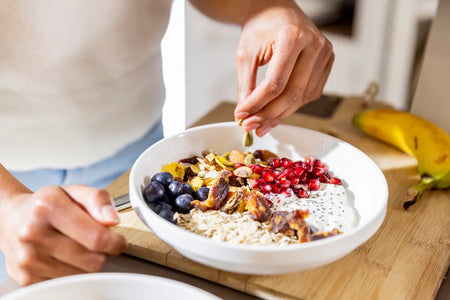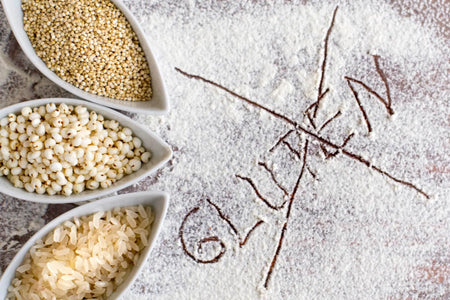Allergies
Food allergies or intolerances? No need to worry! Learn how to eat safely and enjoyably, which allergens are found in foods and how Kölln ensures transparency. With the right information, making conscious choices is easy!

Nutrition for allergies: Important tips & suitable foods
Food allergies and intolerances are often confused – but they have different causes. While an allergy is caused by the immune system overreacting to natural ingredients in food, this is not the case with an intolerance. In these cases, the body lacks certain enzymes or transport proteins to break down or absorb certain components, such as lactose or fructose. A special form is coeliac disease – an autoimmune disease in which gluten damages the small intestine.
The severity of an intolerance or allergy can vary from person to person. While some people experience only mild symptoms, for others, even the smallest amounts of an allergen can cause severe symptoms. Do you have an allergy or intolerance? Here you'll find important information about our Kölln products and tips for a healthy diet.
How does Kölln deal with allergens?
At Kölln, we rely on well thought-out allergen management to ensure transparency and safety. Of the 14 allergens that require labelling, only the following are processed in our plants in Elmshorn.
Cereals containing gluten
A key issue is grains containing gluten, as our products are based on oats. Oats are listed as a grain containing gluten in the allergen regulations – not because they contain large amounts of gluten themselves, but because wheat, rye or barley can inadvertently mix with them through seeds, fields or transport routes. These foreign grains are only completely removed from our specially manufactured products: Gluten-free Delicate Kölln Oat Flakes, Regular Rolled Kölln Oat Flakes and our Gluten-Free Oat Muesli Chocolate. In addition, we deliberately use wheat, rye or barley in some products – you'll find these ingredients marked as such in the list of ingredients. This way, you can decide for yourself what's right for you!
Milk and milk products
Some of our mueslis contain milk components – for example, because of chocolate and biscuits, such as in Kölln Oat Granola Chocolate & Cookie.
Nuts
In some muesli mixes you will find hazelnuts, almonds, pecans and cashews.
Peanuts
Our factories are peanut-free! Products with peanuts are only mixed and packaged externally.
Soy, mustard & sesame
Some Kölln mueslis are produced in facilities that also process soy, mustard and sesame. If this is the case, you'll find a corresponding notice on the packaging.
Always check the packaging! Our recipes are subject to change. Therefore, please read the list of ingredients and allergen information carefully before opening each package.
What you should know about the “May contain” notice
In production, many food products share the same facilities – this can lead to traces of allergenic ingredients unintentionally finding their way into other products. Despite careful measures, this cannot be completely avoided in some cases. This is why you will find information on our packaging such as "May contain milk" or "May contain hazelnuts." You will find the information on possible unintentional content directly below the list of ingredients on the packaging of our products – it's worth taking a quick look!
If you suffer from allergies, talk to your doctor or a nutritionist trained in allergology. This way, you'll find out whether and under what conditions you can safely enjoy ready-to-eat breakfast products such as oat flakes, muesli or crunchy mixes. Safety first!
Allergens in food – What you should know
Food allergies or intolerances can be challenging. Therefore, food law stipulates a list of 14 allergens that may be present in ingredients and must be labelled accordingly. Here's an overview:
- Cereals containing gluten: wheat, rye, barley, oats, spelt, kamut & hybrid strains
- Crustaceans and crustacean products
- Eggs
- Fish
- Peanuts
- Soy
- Milk
- Nuts: these include almonds, hazelnuts, walnuts, cashews, pecans, Brazil nuts, pistachios and macadamia nuts
- Celery
- Mustard
- Sesame seeds
- Sulphur
- Lupine
- Molluscs
How do you identify allergens in our products?
If a Kölln product contains one of these allergens, you will find it clearly highlighted in the ingredients list (e.g., BARLEY malt extract or barley malt extract). We also follow the recommendation to label spelt as a type of wheat; this information is located directly below the ingredients list.
It's worth taking a quick look at the packaging – that way you're always on the safe side!









